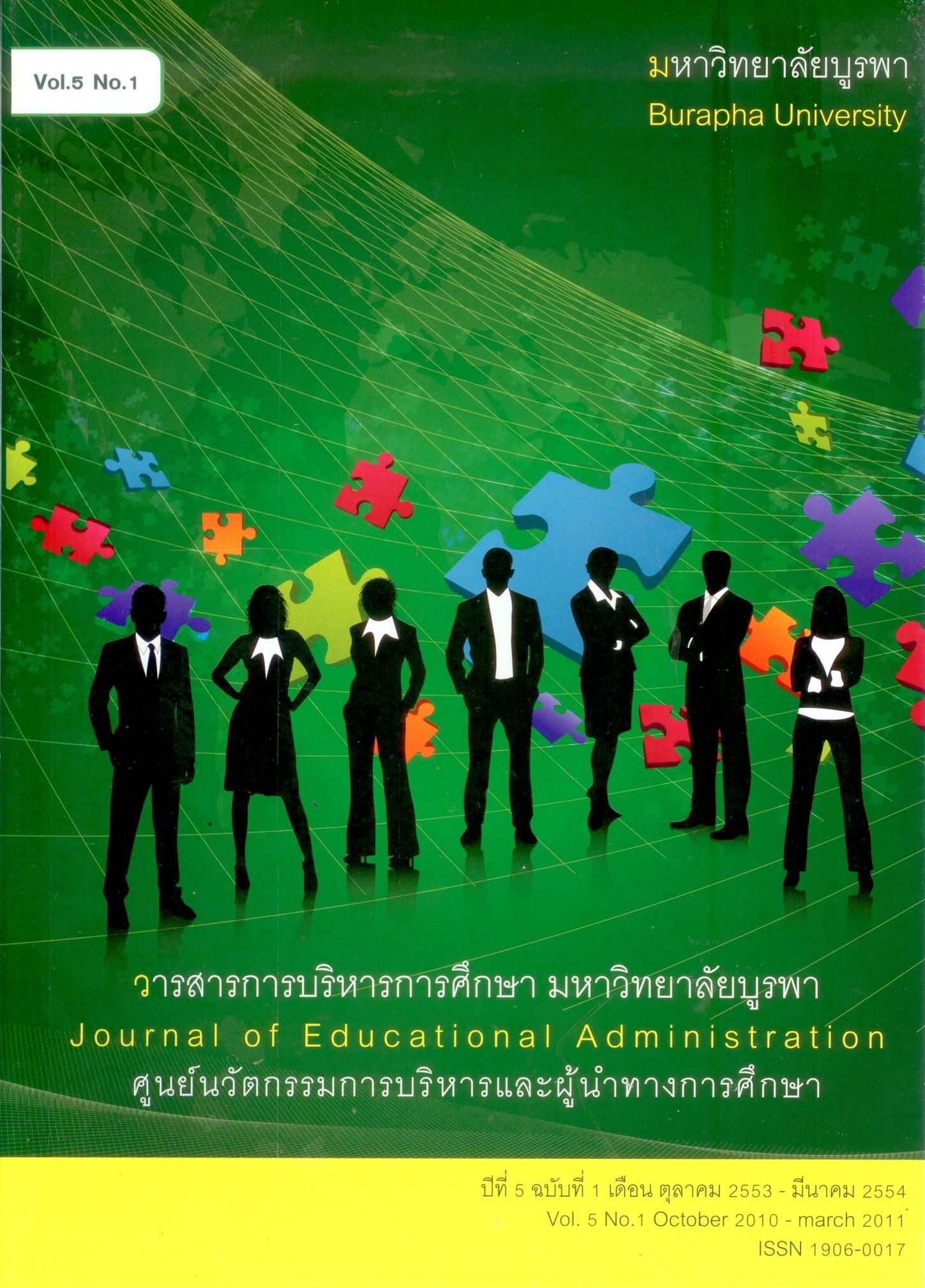รูปแบบการมีส่วนร่วมของชุมชนในการบริหารจัดการสถานศึกษา โดยยึดหลักปรัชญาเศรษฐกิจพอเพียง (The model of Community Participation in School Management Utilizing Economy Philosophy)
บทคัดย่อ
บทคัดย่อ
การวิจัยครั้งนี้ มีวัตถุประสงค์เพื่อค้นหารูปแบบการมีส่วนร่วมของชุมชนในการบริหารจัดการสถานศึกษา โดยยึดหลักปรัชญาเศรษฐกิจพอเพียงและรูปแบบที่ค้นพบนี้สามารถพัฒนาคุณภาพนักเรียนให้มีคุณลักษณะตามหลักปรัชญาเศรษฐกิจพอเพียงได้ ซึ่งผู้วิจัยได้ใช้กระบวนการวิจัยเชิงปฏิบัติการแบบมีส่วนร่วม (Participatory Action Research : PAR) ที่โรงเรียนบ้านคุ้ม สังกัดสำนักงานเขตพื้นที่การศึกษายโสธร เขต 1 มีการเก็บข้อมูลด้วยการสังเกตแบบมีส่วนร่วม การสัมภาษณ์เชิงลึก การสนทนากลุ่ม จากผู้ร่วมวิจัย
ผลการวิจัย พบว่า
รูปแบบการมีส่วนร่วมของชุมชนในการบริหารจัดการสถานศึกษาโดยยึดหลักปรัชญาเศรษฐกิจพอเพียงนั้น ผู้บริหารต้องแสวงหาการมีส่วนร่วมจากผู้ที่มีส่วนได้เสีย (Stakeholders) ได้แก่ ครูและบุคลากร นักเรียน ผู้ปกครอง ชุมชน เพื่อมาร่วมคิด ร่วมวางแผน ร่วมปฏิบัติ ร่วมติดตามและประเมินผลในการพัฒนาคุณภาพนักเรียนให้มีคุณลักษณะตามหลักปรัชญาเศรษฐกิจพอเพียง 3 ห่วง 2 เงื่อนไข โดยการใช้กระบวนการ PDCA ปฏิบัติกิจกรรม ซึ่งผู้บริหารยึดหลักการมีส่วนร่วมในการบริหาร ด้วยการกำกับ ติดตาม ดูแล สร้างขวัญกำลังใจแก่ผู้เกี่ยวข้อง ครู บุคลากร และนักเรียนปฏิบัติกิจกรรมทั้งในโรงเรียน ที่บ้าน ชุมชน และฝึกฝนตนเองจากกิจกรรมอย่างต่อเนื่อง ผู้ปกครองและชุมชน คอยช่วยเหลือกิจการของโรงเรียน เช่น ให้ความรู้ คอยสอดส่อง ดูแล และส่งเสริมครู นักเรียนในการปฏิบัติกิจกรรม โดยโรงเรียนมีหลักสูตรที่ยืดหยุ่น สามารถนำกิจกรรมเศรษฐกิจพอเพียงไปบูรณาการกับทุกกลุ่มสาระ จัดการเรียนการสอนให้สอดคล้องกับวิถีชีวิตจริงมีการติดตามและประเมินผลร่วมกันในการปฏิบัติกิจกรรมอย่างต่อเนื่อง มีการปรับปรุงแก้ไขกระบวนการปฏิบัติกิจกรรมให้มีประสิทธิภาพต่อการพัฒนานักเรียน มีการประเมินผลก่อนและหลังปฏิบัติกิจกรรมร่วมกัน
รูปแบบการมีส่วนร่วมของชุมชนที่ค้นพบนี้ สามารถพัฒนาพัฒนาคุณภาพการศึกษาได้ตามวัตถุประสงค์เพราะทำให้ผู้บริหาร ครูและบุคลากร ผู้เรียน ผู้ปกครอง ชุมชน เกิดการพัฒนาความรู้ ความคิด มีความตระหนักต่อความรับผิดชอบในบทบาทหน้าที่ของตน โดยเฉพาะนักเรียนมีการเปลี่ยนความคิด เปลี่ยนพฤติกรรม เป็นคนมีเหตุผล รู้จักไตร่ตรองใคร่ครวญ มีความขยัน อดทน ประหยัด รับผิดชอบต่อการเรียนมากขึ้นเมื่อเปรียบเทียบกันระหว่าง ก่อนและหลังดำเนินการพัฒนา มีการพัฒนา “คน” ให้เข้าใจในความพอเพียง มีปัญญา กล้าหาญ ยืนหยัดในการ “พึ่งตนเองอย่างพอเพียง” ปฏิบัติกิจกรรมอย่างต่อเนื่อง โดยมีผู้ที่เกี่ยวข้องร่วมรับผิดชอบ เอาใจใส่ดูแล มีการติดตามผล ประเมินผลและเฝ้าระวังอยู่ตลอดเวลา จะนำไปสู่การพัฒนาที่ยั่งยืนได้
Abstract
The purpose of this research was to investigate community participation through a school management model based in the sufficiency economic philosophy. This model can develop the quality of students and through the sufficiency economy philosophy. Participatory Action Research was the principal method utilized to pursue this study. The methods of data collection are as follows :participatory observation, in-depth interview and group discussion at Ban Kum School, the Office of Yagothon's Educational Region 1.
The research results revealed that the most efficient method is to seek for the cooperation of stakeholders (teachers, staff, students, parents and community). This structure actively engages stakeholders to brainstorm, plan, operate and monitor the quality of student development based on the sufficiency economy philosophy (sufficiency economy model) which operates under the PDCA cycle. The roles and responsibilities of stakeholders in. this model is that the school principles should emphasize participatory management, monitoring and encourage their staff in the process. Teachers and staff have the main duty to translate the vision into reality both in the school and community, and to motivate the students through continuous practice. Parents and community should be involved in school activities, for instance, sharing knowledge and supporting various programs. Through a flexible curriculum sufficiency economy activities can be integrated into all course work. The instructional model is based on real life as well as a strong monitoring and evaluation process. Improving the student activities through pre-post evaluations strengthens community participation in the development of school management models and achieves these goals through a higher quality of student educational development.
In reference to the test of this participation model, the stakeholders developed their knowledge by recognizing their responsibility to students and the success of the school. When compared with the students' previous behavior, the test showed their ability to change their minds and behavior through the acquisition of logic, discretion, diligence and greater responsibility in their learning. This applied model builds insight into self - sufficiency, courage, and self-reliance. The activities which were practiced in this exercise supported the monitoring and evaluation process which can bring about sustainable development.


